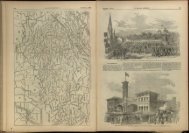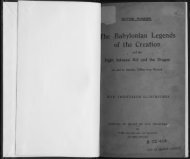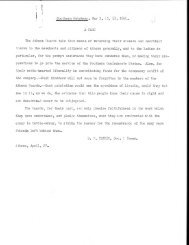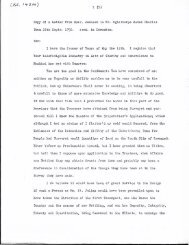THE SHE KING; OR, THE BOOK OF ANCIENT POETRY
THE SHE KING; OR, THE BOOK OF ANCIENT POETRY
THE SHE KING; OR, THE BOOK OF ANCIENT POETRY
Create successful ePaper yourself
Turn your PDF publications into a flip-book with our unique Google optimized e-Paper software.
1G8 <strong>THE</strong> <strong>BOOK</strong> OP POETET. [PAET I.<br />
II.<br />
The Tung man cJtefim ; narrative.<br />
YOUNG PEOPLE <strong>OF</strong> CH'IN.<br />
WANTON ASSOCIATIONS <strong>OF</strong> <strong>THE</strong><br />
1 The white elms by the east gate grow,<br />
And clumps of oaks crown Yuen-k'ew's head ;<br />
There Tsze-chung's daughter oft we see,<br />
Dancing about beneath their shade.<br />
2 On a bright morning they have fixed,<br />
To seek the plain that southward lies.<br />
Then from her task of twisting hemp,<br />
See ! dancing through the mart she hies.<br />
3 The morning fair, young men and girls<br />
Together go. You hear a youth<br />
Say to his mate, " 0 sunflower bright,<br />
Pledge me with pepper-stalk your truth ! "<br />
HI.<br />
The Hang inun; narrative. <strong>THE</strong> CONTENTMENT AND HAPPINESS OP<br />
A POOE RECLUSE.<br />
1 My only door some pieces of crossed wood,<br />
Within it I can rest enjoy.<br />
I drink the water wimpling from the spring;<br />
Nor hunger can my peace destroy.<br />
2 Purged from ambition's aims, I say, '' For fish,<br />
We need not bream caught in the Ho;<br />
Nor, to possess the sweets of love, require<br />
To Ts'e, to find a Keang, to go.<br />
3 " The man contented with his lot, a meal<br />
Of fish without Ho carp can make ;<br />
Nor needs, to rest in his domestic joy,<br />
A Tsze of Sung as wife to take."<br />
IV.<br />
The Tung nun cJie ch'e ; allusive. <strong>THE</strong> TEAISE <strong>OF</strong> SOME VIRTUOUS<br />
AND INTELLIGENT LADY.<br />
BE XII. VI.] <strong>THE</strong> <strong>BOOK</strong> <strong>OF</strong> POETET.<br />
1 To steep your hemp, you seek the moat,<br />
Where lies the pool, th' east gate beyond.<br />
/ seek that lady, good and fair,<br />
Who can to me in song respond.<br />
2 To steep your grass-cloth plants, you seek<br />
The pool that near the east gate lies.<br />
I seek that lady, good and fair,<br />
Who can with me hold converse wise.<br />
3 Out by the east gate, to the moat,<br />
To steep your rope-rush, you repair.<br />
Her pleasant converse to enjoy,<br />
I seek that lady, good and fair.<br />
The Tung mun che yang ; allusive.<br />
TION.<br />
\.<br />
169<br />
<strong>THE</strong> FAILURE <strong>OF</strong> AN ASSIGNA-<br />
1 Where grow the willows near the eastern gate,<br />
And 'neath their leafy shade we could recline,<br />
She said at evening she would me await,<br />
And brightly now I see the day star shine !<br />
2 Here where the willows near the eastern gate<br />
Grow, and their dense leaves make a shady gloom,<br />
She said at evening she would me await.<br />
See now the morning star the sky illume !<br />
VI.<br />
The Moo iniin; allusive. ON SOME EVIL PERSON WHO WAS GOING<br />
ON OBSTINATELY TO HIS RUIN.<br />
This is the argument of these verses finally adopted by Choo He. The<br />
Preface gives an historical interpretation of them which Choo at one<br />
time accepted. They were directed, according to that, against T'o of<br />
Ch'in. This T'o was a brother of duke Hwan (B.C. 743—706), upon<br />
whose death he killed his eldest sou and got possession of the State,—to<br />
come to an untimely end himself the year after. The piece may have<br />
been made against T'o ; but in itself it indicates nothing more than I<br />
have stated.<br />
1 Where through the gate in to the tombs we go,<br />
Thick jujube trees, the axe requiring, grow.








